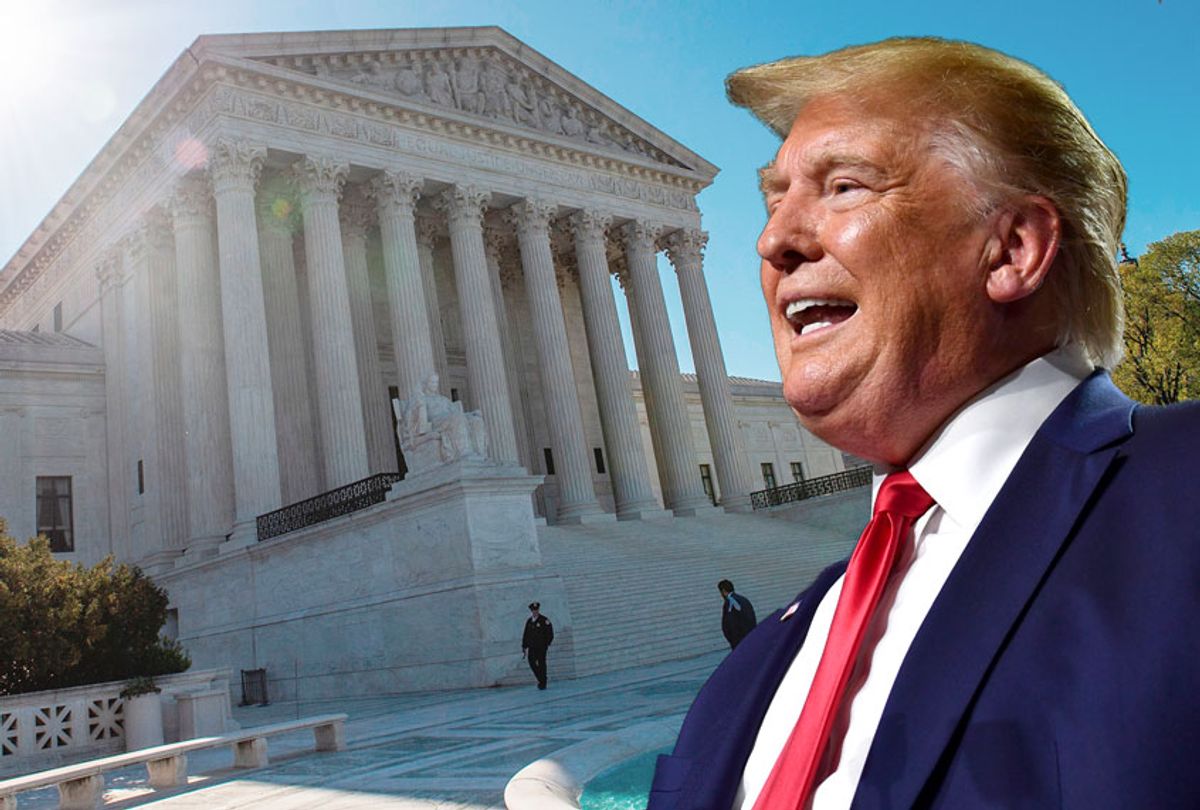Donald Trump is the biggest loser.
While he and Senate Majority Leader Mitch McConnell may get a chance to ram through another justice on the Supreme Court before the November election, it may not do them much good.
The Trump administration is losing case after case in federal courts. Even judges appointed by Republican presidents are ruling against Trump in most of the cases that have been filed by state attorneys general and other plaintiffs challenging actions taken by Trump agencies.
Administrations usually win 70% of the cases brought against them, but Team Trump has won only about 16% of the 132 decided lawsuits. These figures include 14 of 83 lawsuits about environment, energy and natural resources; seven of 53 lawsuits about deregulation; and 3 of 26 lawsuits about health.
Team Trump lost lawsuits about:
- Using the pandemic to give polluters a break from regulation
- Weakening health insurance regulations
- A pesticide that causes brain damage in children
"Over and over and over the Trump agencies are doing things that are outside the bounds of their statutory authority," said Bethany Davis Noll, litigation director of the Institute for Policy Integrity at the New York University School of Law.
The number of cases Trump agencies are losing is especially astounding because judges usually defer to agencies in court cases. This standard is known as "Chevron deference" after a 1984 case, Chevron U.S.A., Inc. v. Natural Resources Defense Council.
"Regulatory slop"
This Chevron test has helped administrations typically prevail in about 70% of the cases that are brought against them. But Team Trump is so bad at even the basics of writing law that George Washington University law professors Robert Glicksman and Emily Hammond termed it "regulatory slop."
Even when the cases were heard by judges appointed by Republicans the Trump administration only won 35% of its cases, Noll found in data she is compiling for a forthcoming paper. They won about 8% of the cases heard by judges appointed by Democrats.
Pandemic break for polluters
Susan Bodine, the EPA enforcement chief, used the coronavirus pandemic that is killing thousands of us to give polluters a break from regulation. Three days after the American Petroleum Institute asked the EPA for help, Bodine gave a reprieve to refineries, operators of public drinking water systems and other industries.
President Harry S Truman signed the Administrative Procedure Act, which governs how federal agencies write new regulations, into law in 1946. One of those provisions requires agencies to let the public know when new rules are being written so they can comment. Bodine failed to do this. New York Attorney General Letitia James and attorneys general from eight other states sued. Bodine ended the policy.
Healthcare rollbacks
Team Trump also relaxed Labor Department regulations for association health plans. The new rule, published by Preston Rutledge, an assistant secretary, let companies evade requirements of the Affordable Care Act that they offer essential benefits such as maternity care, substance abuse treatment and prescription drug coverage.
New York, 10 other states and the District of Columbia sued over the rule that allowed employers to band together on the basis of geography or the type of industry they're in to offer substandard health insurance to their employees.
"The final rule is clearly an end-run around the ACA," wrote federal judge John Bates who was appointed by President George W. Bush.
Bates found the rule unlawful under the Employer Retirement Income Security Act, the 1974 law about employee benefit plans. Team Trump appealed the ruling.
States take the lead
Democratic attorneys general like Bob Ferguson of Washington state, and Massachusetts Attorney General Maura Healey have repeatedly sued the Trump administration.
Ferguson filed his state's first lawsuit against Trump in January 2017, just 10 days after Trump was sworn in, over the travel ban that temporarily barred people from seven mostly Muslim countries.
"I view my role as being on the first line of defense against a Trump administration," Ferguson said in November 2016.
Every 10 days
Attorneys general — the top legal officers in their state — filed or tried to take part in 130 lawsuits involving more than one state since Trump took office. That's about a lawsuit every 10 days.
Paul Nolette, an associate professor of political science at Marquette University in Milwaukee, who tracks the lawsuits, said Democratic attorneys general have won about 80% of the 123 lawsuits they have filed that have been decided so far.
More suits brought
Team Trump has been sued by state attorneys general more than President Barack Obama was during his two terms. Seventy-eight multi-state lawsuits were brought against the Obama administration.
President George W. Bush faced 76 such lawsuits; President Bill Clinton, 42.
In 2007, states gained more power to sue the federal government in a Supreme Court decision, Massachusetts v. EPA. The landmark decision ultimately required the EPA to regulate greenhouse gas emissions.
Justice John Paul Stevens, who wrote the decision, quoted the reasoning of Oliver Wendell Holmes from a 1907 case about air pollution: The state "has the last word as to whether its mountains shall be stripped of their forests and its inhabitants shall breathe pure air."
Congressional gridlock
Presidents are governing more by executive action and rulemaking because Congress is gridlocked. That leaves those decisions more vulnerable to court challenges.
Red states like Texas where Attorney General Ken Paxton has almost 750 attorneys are Trump's backstop. Paxton and other Republican attorneys general use their offices to defend Trump policies or sue to undo Obama policies.
Texas is the lead plaintiff in a lawsuit by 20 states to try to invalidate the Affordable Care Act. A Republican Congress passed a tax bill in December 2017 that eliminated the individual mandate, the penalty for people who go without insurance created by the Affordable Care Act.
Paxton and other red states used that change to challenge the law. In December 2018, federal judge Reed O'Connor ruled that the individual mandate is unconstitutional, making the rest of the law invalid. The Fifth Circuit partially affirmed that decision, and the Supreme Court has agreed to hear the case.
Texas also is the lead plaintiff in cases involving the Indian Child Welfare Act and Deferred Action for Childhood Arrivals.
Picking courts
Attorneys general try to cherry pick which judges they can win with if the case is appealed. Republican attorneys general like the Fifth Circuit, based in New Orleans, which hears cases from Louisiana, Mississippi and Texas, is known as our nation's most conservative.
Democratic attorneys general prefer the Northern District of California and Southern District of New York.
California is second only to New York in number of lawsuits in which it is the lead plaintiff. California Attorney General Xavier Becerra has sued Trump even more than Texas sued the Obama administration.
In 2017, then-EPA Administrator Scott Pruitt overruled his own scientists to prevent an agriculture ban of a DowDuPont pesticide that causes brain damage in children.
Dow Chemical, which merged with DuPont in August 2017, contributed $1 million to help underwrite Trump's inaugural festivities. Corteva, the agricultural unit of DowDuPont, later was spun off as an independent company.
California, New York and six other states intervened in a lawsuit brought by the League of United Latin American Citizens and other groups. Trump's EPA attorneys argued that the court didn't have the authority to hear the case under the Federal Food, Drug and Cosmetic Act.
Chlorpyrifos is part of a class of chemicals developed as a nerve gas by Nazi Germany during World War II, but it was approved as a pesticide in the United States in 1965.
Judge Jed Rakoff noted that the EPA had stalled banning the pesticide chlorpyrifos for a decade.
"The time has come to put a stop to this patent evasion," Rakoff wrote.
Corteva Inc. announced in February that it will stop making the pesticide.




Shares